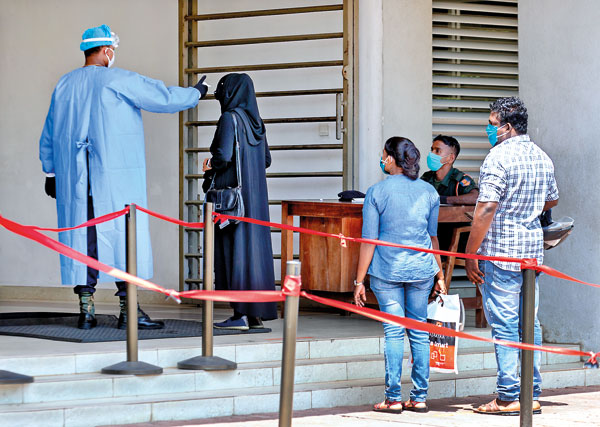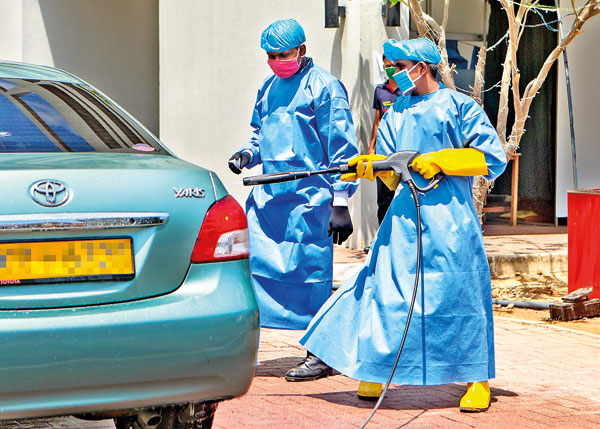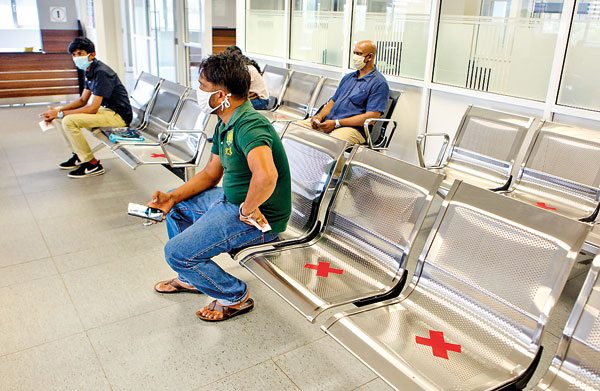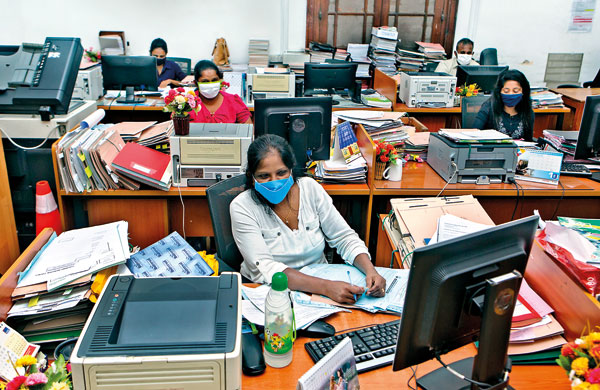News
Stepping out into the ‘new normal’ in the age of COVID-19

Isurupaya, Battaramulla: Fever checking and disinfecting vehicles. Pix by Sameera Weerasekera
Health and social distancing guidelines were in force as the country started gradually moving out of a seven week lockdown this week on the way to restoring normalcy in what is now called the “new normal” in the age of COVID-19.
When civilian life and work commenced last Monday (11), only the districts of Colombo and Gampaha continued to remain under an indefinite curfew. This was after Kalutara and Puttalam districts, which had also been under an indefinite curfew with Colombo and Gampaha, joined what are now known widely as the “other districts” where curfew is only enforced from 8 p.m. to 5 a.m. on a daily basis.
A large number of state employees in places such as District and Divisional Secretariats continued to work even during curfew, pointed out J.J. Ratnasiri, Secretary to the Ministry of Public Administration, Home Affairs, Provincial Councils & Local Government. “More than 50% of staff in Government offices outside Colombo and Gampaha districts are working now. It is only in these two districts that we are having a limited number of staff coming in. That too will gradually increase depending on the advice of health officials,” he stressed.
Except for the select number of office trains for those traveling to Colombo for work, travel between districts continues to be prohibited. Minister of Passenger Transport Management Mahinda Amaraweera told the Sunday Times on Friday (15) that discussions were currently underway with health authorities to look into the possibility of buses being allowed to operate within a province rather than being limited to a district. “We are hoping that buses are allowed to operate across districts within the province as the next step. We will have to see what health authorities say.”
Buses and trains of the Sri Lanka Transport Board (SLTB) and Sri Lanka Railways (SLR) were reserved for public and private sector employees travelling to work. A small number of private buses were also in operation. The number of passengers that both buses and trains could transport was initially restricted to 50% of their total seating capacity. This rule had changed by Wednesday (13), when health officials gave approval for buses and trains to transport passengers according to the number of seats. For the time being, public transport continues to be off limits for those other than workers reporting to work.
 Transport Ministry sources disclosed on Friday that there was a possibility that buses will be allowed to operate across districts in the Southern province as a first step next week, given that the province’s three districts, Galle, Matara and Hambantota, have recorded only a small number of COVID-19 patients.
Transport Ministry sources disclosed on Friday that there was a possibility that buses will be allowed to operate across districts in the Southern province as a first step next week, given that the province’s three districts, Galle, Matara and Hambantota, have recorded only a small number of COVID-19 patients.
Under the Government’s plans to resume civilian life and work in districts under curfew, heads of both state and private sector entities were given the responsibility to decide the number of employees who should return to work. Only a minimum number of employees required to conduct day-to-day activities of the organization were to be called into work, with private sector entities being requested to open at 10 a.m. daily.
Those coming into work had to face a completely new reality. Masks were mandatory for all, with health and social distancing guidelines in effect. Handwashing facilities were installed at the entrance and exits of bus and train stations as well as most offices and commercial establishments in light with guidelines issued by the Health Ministry. Employees also had their temperatures taken prior to being allowed into trains or offices. Hand sanitizers were also available while seating arrangements had also been changed in offices to ensure social distancing guidelines were adhered to.
Many shops in the Colombo and Gampaha district opened on Monday for the first time since the country was placed under an islandwide curfew on March 20. Supermarkets also opened their doors in branches in the districts for customers. In line with health guidelines, the number of customers admitted to a store at any given time was limited to a designated number. Customers were provided with hand-washing facilities as well as hand sanitizers. Some supermarkets had installed foot-operated sinks as an additional safety precaution.
Long queues though, were witnessed outside wine stores which opened this week in districts outside Colombo and Gampaha. While wine stores continued to be closed in Colombo and Gampaha, supermarkets in the two districts were allowed to sell alcohol, resulting in long queues forming outside supermarket outlets where liquor was available.

Passport office: Social distancing in operation
Deputy Commissioner of Excise Kapila Kumarasinghe said in districts outside Colombo and Gampaha, only licensed wine stores can sell alcohol and bars and taverns will remain closed for the time being. He added that wine stores have been instructed to ensure that customers respect health and social distancing guidelines. The same applies to supermarkets selling alcohol in Colombo and Gampaha.
As far as police are concerned, public behaviour has been by and large satisfactory during the first week of the resumption of civilian life, Police Spokesman Superintendent of Police (SP) Jaliya Senaratne stated. He acknowledged there were some issues in Colombo and Gampaha districts where people failed to follow the pass system allowing them to go out to buy essentials on a given day based on the last digit of their National Identity Card (NIC). “We understand sometimes it is difficult for people, but police will enforce this rule, especially if we feel that a large number of people are on the roads unnecessarily, posing a health risk,” he said.
SP Senaratne said traffic had not been as bad as many had expected because police had put in a plan to speed up checking at entry points to Colombo. “We removed some of the road barriers but modified our checkpoints so that up to five vehicles could be checked at once, allowing for a relatively smooth flow of traffic,” he claimed.
Heightened interest in online banking
State and private banks also started operating most of their branches this week, with the Government lifting some lockdown restrictions in curfew-hit Colombo and Gampaha districts.
A senior private bank official told the Sunday Times that they had seen a spike in interest among customers to register for online banking.
“We promoted online banking in the past, too, but many customers still preferred to visit the banks to conduct their transactions. However, we are now seeing a big interest among customers to register for online banking, probably because they feel safer banking online,” she opined.
Many customers are visiting banks to apply for loan concessions announced by the Central Bank in view of the hardships people faced during the COVID-19 lockdown, the official said.
Nevertheless, there have not been any reports of very large queues forming outside banks and most customers are adhering to social distancing guidelines.

Back at work at the CMC
SLTB chief sees improvement in commuter discipline
Transport sector strictly follows health guidelines
The Sri Lanka Transport Board (SLTB) used only part of its more than 4500-strong fleet this week, because the number of commuters was less than expected, Chairman Kingsley Ranawaka said.
He noted drivers and conductors had not reported many issues this week, though there were some problems with commuters not following social distancing guidelines in the beginning when the number of passengers in a bus was limited to half the number of seats. In most buses, this meant that only about 25 passengers could travel at one time.
He said there were problems when people jostled to get in for the few available seats. This problem had been somewhat sorted out by the middle of the week with the health authorities beginning to monitor the buses to ensure that they carried passengers according to the number of seats, he said.
Authorities also allowed licensed taxi services to transport passengers in Colombo and Gampaha to and from work this week.
PickMe Chief Executive Officer Zulfer Jiffry said they were operating a reduced number of vehicles in the curfew-hit Colombo and Gampaha districts owing to the less number of travellers. Mr Jiffry said drivers had been instructed to adhere strictly to health guidelines, such as social distancing, wearing masks and gloves and carrying a limited number of passengers as instructed by police.
He added that drivers’ temperatures were regularly checked and customers, when log into the app, could note the temperature of the driver taken within the past 24 to 48 hours. “We are also installing separators in our vehicles to prevent the virus spreading from driver to passengers or from passengers to drivers,” he added.
Meanwhile, Sri Lanka Railways (SLR) deployed 10 office trains from outstations throughout this week for the benefit of those travelling to Colombo for work, with the same 10 trains departing from Colombo Fort and Maradana stations each evening.
While this arrangement was employed during the first two days, by Wednesday, SLR allowed public and private sector employees who had not reserved seats to board the trains at specific stations en route to Colombo, subject to availability of seats. This was after health authorities agreed to allow buses and trains to carry passengers based on the number of seats available. Earlier in the week, the number of passengers buses and trains could transport had been limited to 50% of total seating capacity. SLR would continue to give priority to employees who reserve railway seats, General Manager Dilantha Fernando told the Sunday Times. He added that depending on the lists of the number of employees heading for work, they may increase the number of office trains next week. “We are also allowing those who don’t have a seat reserved to board a train from railway stations by showing their service identity card, but this is strictly subject to availability of seats on each train,” he stressed.
Three-wheeler unions accuse police of double standards
Say big-time taxi companies are allowed to operate, but poor tuk-tuk drivers are harassed
While Police Headquarters says three-wheelers can operate in the curfew-hit Colombo and Gampaha districts subject to conditions, unions and owners claim that officers on duty continue to harass them even going to the extent of arresting them.
Some unions say the problem stemmed from confusion over instructions issued at the highest levels of the police. According to an announcement issued by Acting Inspector General of Police (IGP) Chandana Wickramaratne on the night of May 10 hours before some lockdown restrictions were lifted at 5 am on May 11 in the two districts, only two adult passengers can travel in a three-wheeler in addition to the driver. It also permitted taxi services such as PickMe and Uber to operate on condition that the maximum number of passengers in taxis should be limited to two adults in addition to the driver. Under all circumstances, adherence to health guidelines was made mandatory.
All-Island Three-Wheeler Drivers’ and Owners’ Association Chief Sudhil Jayaruk said police were allowing three-wheeler companies such as PickMe and Uber to operate but were stopping other three-wheeler drivers. “We find it puzzling as to how police are allowing three-wheelers attached to taxi services to operate while preventing others. We raised this issue at a discussion with Transport Minister Mahinda Amaraweera on Tuesday and he promised to look into it and resolve the matter by next week. Three-wheeler drivers have been without an income for two months and it’s unfair that they continue to be denied the opportunity to work,” he said.
There are some 850,000 three-wheeler operators in the country and nearly 380,000 of them are resident in the Colombo and Gampaha districts, claimed Sunil Jayawardena, President of the National Three-Wheeler Self-Employed Federation. He said he had received complaints that in some areas in Colombo police officers were forcing passengers to get out and ordering the three-wheeler driver to leave. “It appears that the IGP is promoting taxi companies and victimising other drivers, who are daily wage earners,” he said.
Police Spokesman Jaliya Wickramaratne said all three-wheelers could operate but police would not allow three-wheeler drivers to congregate in so-called three-wheeler parks.
“They can’t stop their three-wheelers in these parks or on the road waiting for passengers. However, if known passengers call them and ask that they be given a ride to their workplaces, they can accept the hires, but they will not be allowed to travel around in these districts looking for hires,” he explained.
Rohana Perera, Secretary to the National Three-Wheeler Drivers’ and Industrial Workers’ Association, said the Police Spokesman’s statements did not correspond with the ground situation. “I went to the Bambalapitiya Police to inquire over the matter and was told by no less a person than the OIC himself that only three-wheelers belonging to taxi services are allowed to operate in Colombo. This is ludicrous. Police are arresting three-wheeler drivers and confiscating their vehicles. They were only trying to earn a living and their livelihoods are being taken away,” he lamented.
All Island Three-Wheeler Drivers’ Union President Lalith Dharmasekara said he believed there was a serious miscommunication over the matter. “I don’t think the message was communicated properly. I hope they rectify the situation by next week.”
Three-wheeler unions accuse police of double standards
Say big-time taxi companies are allowed to operate, but poor tuk-tuk drivers are harassed
While Police Headquarters says three-wheelers can operate in the curfew-hit Colombo and Gampaha districts subject to conditions, unions and owners claim that officers on duty continue to harass them even going to the extent of arresting them.
Some unions say the problem stemmed from confusion over instructions issued at the highest levels of the police. According to an announcement issued by Acting Inspector General of Police (IGP) Chandana Wickramaratne on the night of May 10 hours before some lockdown restrictions were lifted at 5 am on May 11 in the two districts, only two adult passengers can travel in a three-wheeler in addition to the driver. It also permitted taxi services such as PickMe and Uber to operate on condition that the maximum number of passengers in taxis should be limited to two adults in addition to the driver. Under all circumstances, adherence to health guidelines was made mandatory.
All-Island Three-Wheeler Drivers’ and Owners’ Association Chief Sudhil Jayaruk said police were allowing three-wheeler companies such as PickMe and Uber to operate but were stopping other three-wheeler drivers. “We find it puzzling as to how police are allowing three-wheelers attached to taxi services to operate while preventing others. We raised this issue at a discussion with Transport Minister Mahinda Amaraweera on Tuesday and he promised to look into it and resolve the matter by next week. Three-wheeler drivers have been without an income for two months and it’s unfair that they continue to be denied the opportunity to work,” he said.
There are some 850,000 three-wheeler operators in the country and nearly 380,000 of them are resident in the Colombo and Gampaha districts, claimed Sunil Jayawardena, President of the National Three-Wheeler Self-Employed Federation. He said he had received complaints that in some areas in Colombo police officers were forcing passengers to get out and ordering the three-wheeler driver to leave. “It appears that the IGP is promoting taxi companies and victimising other drivers, who are daily wage earners,” he said.
Police Spokesman Jaliya Wickramaratne said all three-wheelers could operate but police would not allow three-wheeler drivers to congregate in so-called three-wheeler parks.
“They can’t stop their three-wheelers in these parks or on the road waiting for passengers. However, if known passengers call them and ask that they be given a ride to their workplaces, they can accept the hires, but they will not be allowed to travel around in these districts looking for hires,” he explained.
Rohana Perera, Secretary to the National Three-Wheeler Drivers’ and Industrial Workers’ Association, said the Police Spokesman’s statements did not correspond with the ground situation. “I went to the Bambalapitiya Police to inquire over the matter and was told by no less a person than the OIC himself that only three-wheelers belonging to taxi services are allowed to operate in Colombo. This is ludicrous. Police are arresting three-wheeler drivers and confiscating their vehicles. They were only trying to earn a living and their livelihoods are being taken away,” he lamented.
All Island Three-Wheeler Drivers’ Union President Lalith Dharmasekara said he believed there was a serious miscommunication over the matter. “I don’t think the message was communicated properly. I hope they rectify the situation by next week.”


